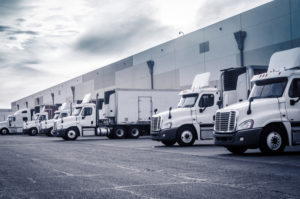You have read all about shortages of fuel, food, lumber, gas, ammo, computer chips, and many other things Americans need every day. A shortage in truckers is contributing to each of those other shortages, as it becomes more difficult to move material and finished products across the country. Angela Yang reports in the Boston Globe:
Local coffee shop constantly out of your favorite ingredient lately? Can’t find what you’re looking for at the store? Packages arriving late?
The problem might be as simple as having too few people to drive the stuff around.
A shortfall of truck drivers is one factor clogging every facet of the supply chain right now, and Massachusetts is feeling the impact. It’s not a new problem, industry experts say, but like so much else, the global pandemic has made it worse.
It’s even affecting America’s oldest county fair.
This year, the Trucking Association of Massachusetts had hoped to participate in a Touch-a-Truck event Friday at the Topsfield Fair, parking a truck there for kids to climb on and play around. But executive director Kevin Weeks said his group had to back out. They couldn’t spare a driver.
One reason, Weeks said: The need for trucking just “exploded” during the pandemic, with all the online shopping from consumers working from home.
Get Innovation BeatBoston Globe tech reporters tell the story of the region’s technology and innovation industry, highlighting key players, trends, and why they matter.
Sharing a truck with another driver — who has spent hours in the cab on the previous shift — always posed some risk, Weeks said, especially for older folks more vulnerable to COVID-19. And while the association lobbied for truckers to move up in the vaccination line, it and other trucking groups were largely unsuccessful.
With many rest stops closed during the early stage of the pandemic, truck drivers also struggled to find places to shower and sleep along their routes. Dining options were limited, too: Many fast-food restaurants shuttered indoor ordering, and 18-wheelers aren’t built for a drive-through lane.
Through it all, Weeks said, truckers were working “probably more than they want to work” while trying to stay within safety guidelines that dictate the maximum number of hours they can drive. The combination of these dilemmas has pushed some drivers to leave the industry or retire early.
“Nobody wants to put anybody in harm’s way, whether it’s the driver or the contents of the truck or certainly the vehicles and the people that are around them,” he said. “So it’s difficult, and they’re coping as best they can, delivering as much as they can as quickly as they can. But the fact of the matter is it takes longer to get things now.”
And as older drivers age out of trucking, younger ones aren’t replacing them fast enough. Qualifying to be a commercial driver requires a lot: a stellar driving record and passing background checks, drug testing, and a slew of other requirements. And the long-haul life’s not for everyone; turnover among newly minted drivers is high.
Action Line: America’s supply chain is stretched thin. You should consider having extra supplies of the essentials stocked away at home in the event the system breaks down completely. Start with water. If you’re buying bottled water, remember that it’s being shipped on a truck. You need to protect yourself from unexpected disruptions in that supply. Next, if you’re serious about getting prepared, but can’t stay motivated, click here to sign up for my free monthly Survive & Thrive newsletter. I’ll help you stay motivated and beat the inertia that’s holding you back. But only if you’re serious.
E.J. Smith - Your Survival Guy
Latest posts by E.J. Smith - Your Survival Guy (see all)
- Your Survival Guy Breaks Down Boxes, Do You? - April 25, 2024
- Oracle’s Vision for the Future—Larry Ellison Keynote - April 25, 2024
- Investing Is Math - April 25, 2024
- Breaking: New Rules on Trillions in IRAs and 401(k)s - April 24, 2024
- When You’re in Control, You Have Opportunities - April 24, 2024
















